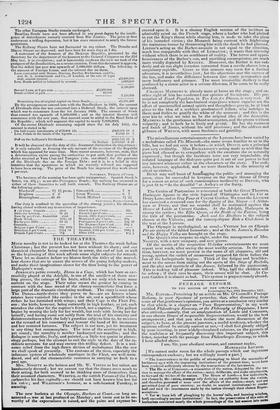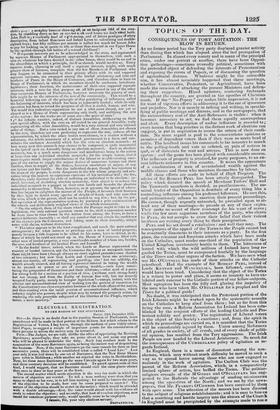PEERAGE REFORM.
TO THE EDITOR OF THE SPECTATOR.
Leamington Spa. 20th December 1835 .
Ma. Ems-on—Perceiving by an article on Mr. O'Connell's Peerage Reform, in your Spectator of yesterday, that, after dissenting from- some of that gentleman's opinions, you arrive at a conclusion very similar to that which, in a chapter on " Pure Representation," in my work entitled Philanthropic Economy, or the Philosophy elf floppiness, I have also arrived,—namely, that an amalgamation of Lords and Commons, in one chosen House of responsible Representatives, would be the best arrangement ; and that you also declare the mere discussion of the subject, to have, at the present juncture, a useful tendency, whether the opinions offered be strictly correct or not,—I shall feel greatly obliged by your inserting, in your widely-circulated columns, on the grounds of the usefulness of frequently discussing this important subject, this letter, together with the passage from Philanthropic Economy, to which I have alluded above.
I am, Sir, your obedient servant, and constant reader, MARGRACIA Loenot:r. [ We cannot make room for the whole passage which our ingenious correspondent encloses ; but we willingly insert a part.)
" The ircoavenience to the public of attempting to blend the anomalies of barbarous ago s with the improving institutions of the present time, mast have been rendered sufficiently- obvious by the transactions of the last session. The Ho sa of Commons—a committee of the nation, delegated by the na- tion to manage the affairs of the nation—meet, deliberate, and make enactments, to forward the wishes of the nation. The House of Lords—a few individuals, not chosen by the ration, consequ ,Qtly deriving no authority from the ration, and therefore possessed of none over the affairs of the nation—meet, and are permitted (out of pure courtesy, no doubt, to ancient institutions) to render null and void the enactments made by the nation through their chosen Repre- sentatives. ". Yet w.: have left off ploughing by the horses' tails, and burning witches, both exceedingly ancient institutions! In fact, the preservation of this relic of barbarism converted nearly the whole proceedings of the last session into yam ehild'a pia, : a naughty brother showing off, as an incipient /Ind of the crea• TOPICS OF THE DAY. John by tumbling down as fast as erer e..ch card house his little bike/ built. • John Bull is riverbially fond of lest-seeing, and of infant prodigies of .Very description, from infant Rosciuses and Infant Lyres to calculating and double-
sighted buys; but fifty millions per annum is rather too touch for honest John to pay for looking on at sports so idle as those thus enacted in our Upper House by the spoiled-through-life babies of a second childhood ! • • • " If separate interests are to be acknowledged in the state, and represented by separate Houses of Parliament appropriated to themselves, with such a veto on whatever has been decided in an other house, there would be no end to the absurdities in which a principle, itself so absurd, would involve us. Every separate trade, choosing to call itself a separate interest, might, with much
greater show of fairness, complain that the few Members of Parliament who may happen to be connected in their private affairs with its said supposed separate . interests, are swamped among the landed aristocracy and sons and brothers of Peers in the House of Commons, and therefore claim to have its House of Parliament, in which its members should be unchosen, hereditary legislators; their function, the maintenance of their own supposed separate interests, with a veto for that purpose on all bills passed in any of the other thus numerous Houses of Parliament, however necessary the passing of such bills might be to the interests of the rest of the community. This would be a ?beautiful following out of the principle of that paralyzing of influences, called the balancing of interests, which has been so ignorantly lauded ; while its only operation has been to retard the progress of all that is useful, honest, and wise. Yet 'would this ridiculous supposition be not a whit more absurd, nor yet so absurd as is a House of Peers representing only itself, and nullifying the acts of the nation: for the trades are of some use—the peers of none ! ," An infinite number, indeed, of distinct Assemblies, deliberating on their own special affairs, with the veto on all vested in one general Assembly, truly 'representing all the other Assemblies, would be a very natural and very rational .order of things. But a veto vested in any one of those Assemblies, not chosen by the rest, therefore not even professing to represent the rest, reduces all the representation, by which the other bodies were chosen, to a shadow without a substance, the whole mummery of a mixed government to a farce, and con- stitutes the unchosen Assembly which has the veto an absolute monarch : of how many men this monarch may chance to be composed, is quite immaterial to the fact of such an Assembly being an absolute monarch. Such an absolute monarch, too, is a much more dangerous and mischievous being to the nation at large than any individual absolute monarch ; for the simple reason, that it must require much larger contributions of the labour or wealth-creating ener- gies of the nation to supply the unjust desires of numerous tyrants and their families, than to supply all the desires, however exorbitant or unjust, of any one tyrant and his family. But the individual despot, though less injurious to the mass of the people, is inure dangerous to the few whom property and edu- cation bring the nearest to capricious exercises of his individual will ; the few, therefore, early discover the evils of suffering an individual to be absolute : in- stead, however, of abolishing absolute monarchy, their object is to reduce the individual monarch to a puppet iu their own hands and transfer the absolute monarchy to themselves. When, however, as at present, the spread of educa- tion has begun to enlighten the masses of the People, it becomes their business by that light to detect every species of sleight-of-hand, and take care that the veto, which is the power, shall not he vested in any few ; but, by the per- fect operation of the representative system, be rendered a pure condensation of the soberly and deliberately weighed views of the whole community.
" On the subject, then, of the share which the Peerage ought to take in the legislation, the only rational question seems to be, shall a convenient number be from time to time chosen by the nation from among the Peers, to form a second deliberate Assembly; or shall any number that can obtain the confidence of the electors juin the Commons, and taking seats in their Assembly, mingle votes with theirs, without distinction.
'4' The latter appears to be the least complicated, and much the most rational arrangement ; for what interest or privilege can a man of landed property, merely because a title happens to be added to his name, have to defend, in de- fence of which he could riot stand up in the House of Commons, filled with other men of landed property, a very considerable number of whom are, besides, the sons and brothers of his brother Peers and himself ?
" In the feudal times, indeed, when the Lords or Barons represented the country or landed interest, and the Commons the towns or mercantile interest, there might have been (though always on shortsighted grounds) some shadow of two interests; but now that Lords and Commons form one atistocracy, almost one family, all representing and guarding, alas ! but too selfishly, the wealth already created, and all having a personal interest in taxing the wealth to be created or power or act of creating wealth,—such taxes consti- tuting the perquisites of themselves and their relations,—what need of a pecu- liar strong-hold for a section or a portion of this, (without such strong-hold) but too strong, and from the frailty of human free• will, but too severely tempted family party, merely to hamper legislation ?—except, indeed, with the ulterior and unconstitutional view of making (on the pretext of veneration for the Constitution) one close corporation business of the whole affairs of the nation, and thus evading even the small portion of unconstitutional influence, which .industry might else possess, despite what may be termed the property union, by rendering the only peaceable safeguard of the liberties of the People, represen- tation, a mere witchery."



























 Previous page
Previous page